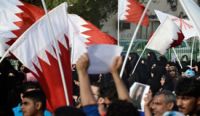

The worsening situation in the Persian Gulf island of Bahrain has reached alarming proportions with the Aal-e Khalifa minority regime indulging in the most blatant violation of human rights with the military backing of the Aal-e Saud minority regime of Arabia and with the blessings of the US, whose intruding 5th Fleet is based in Bahrain.
Conscientious journalists in the West have been shocked by the crimes against humanity of the Aal-e Khalifa minority, which in a bid to cling on to power is creating sectarian differences between the long oppressed Shi’ite Muslim majority of the island and the Sunni minority that had traditionally lived in peace. The regime is using hirelings from other countries including Pakistan to fan flames of sedition.
Recently Reese Erlich of the US-based Global Post was in Bahrain and she interviewed several persons, including female activist Farida Ghulam. The journalist writes: Farida settled down on a brocaded couch in her home in an upscale district of Manama. She’s a leader of the center-left Waad party. After pouring some strong, sweet tea, she explained how sectarian differences have begun to rip apart Bahraini life. Bahrain’s population of 1.2 million is over 75 percent Shi’ite Muslim and less than 25 percent Sunni. The ruling family of Shaikh Hamad bin Isa al Khalifa – who now styled himself as king – is Sunni, but for many years both groups coexisted. But that began to change in February 2011 when, inspired by the Arab Spring uprising – or more properly the Islamic Awakening –tens of thousands of Bahrainis poured into the streets. The opposition included both Shiite and Sunni, united in their calls for democratic reform. But as the conflict dragged on, sectarian differences were made to emerge. Farida Ghulam said the Sunnis know the regime is corrupt, and for this reason the ruling clique is stoking unwarranted fears that takeover by the Shi’ite Muslims would lead to suppression of the minority. It’s like McCarthyism in the 1950s US, she added.
Regime officials try to deny that they stoke the fires of sectarianism. Abdul Aziz Al Khalifa, a regime spokesman and second cousin to the minority ruler, said: Shi’ite Muslims are beholden to their religious leaders, something he didn’t assert about other religious groups. He claimed that there are significant numbers who want to follow the state system that is present in Iran today.” He said: “There have been calls for an Islamic Republic in the past. I think under the surface, there are many more who believe in that form of government.”
The question that arises here is that: What is wrong for being inspired by the Islamic Republic system in Iran? Historically, there have been ties between the people of Bahrain and Iran, which is just across the Persian Gulf. The al Wefaq Islamic Society, Bahrain’s largest opposition group, gained inspiration from Iran’s 1979 revolution against the Shah. Ali Salman, General-Secretary of al-Wefaq Party, which is the largest opposition group is a religious scholar who was educated in the holy city of Qom in Iran. He is spearheading the campaign for equal rights and says the model of government for Bahrain will be in accordance with the demography and culture of the people of Bahrain. He points out at the wide scale discrimination. For instance, the poor, predominantly Shi’ite areas has dusty streets and low-rise, concrete houses — a sharp contrast with Manama’s glistening skyscrapers.
In late October, the regime prohibited all demonstrations, but the people of the town of Muhazza regularly defy the ban. Residents have erected roadblocks made of palm tree trunks and concrete blocks in an effort to keep out the security forces. At 3 a.m. one recent morning, police surrounded the apartment of Abdullah al-Mizo, an electrician. He said masked men in civilian clothes pounded on the doors and windows, and eventually kicked in one door. He said the men were from Bahrain’s security services. “They called me bad names,” he recalled. “They said you are Shi’ite and a terrorist.” Al-Mizo said he had not participated in demonstrations and argued that the regime is collectively punishing all Shi’ite Muslims. “I don’t know why they raided my house,” he said. “I think they did it to intimidate people. I am not a political activist but I will become one because of the regime’s actions.” Under attack for being Shiite, al-Mizo in turn, distrusts Sunnis. He noted that the regime has recruited Wahhabi mercenaries from Pakistan, Syria, Jordan and certain other countries, to serve in the police force. He says their religion teaches them to hate Shi’ite Muslims.
Al-Wefaq’s Ali Salman acknowledged the current state of Sunni-Shi’ite relations is “very complicated.” He argued that the regime has used clever divide-and-rule tactics long before the February uprising last year. He pointed out that the plan of the regime is to instill in the Shi’ites the hatred of Sunnis, and instill in the Sunnis the hatred of Shi’ites, despite the fact that the two communities have lived peacefully for several centuries. At the same time, the regime tells the secular opposition that al-Wefaq and religious groups are hopelessly backward. When each group distrusts the other, said Salman, the winner will be the ruling regime. Over the past six months, however, Salman has seen changes in the Sunni community. “They realize that the regime lies,” he said. They know “all the communities need a change.” “The only way for this small island state to survive is to put aside Muslims and non Muslims, Sunni and Shi’ite, and come together as Bahrainis.”







